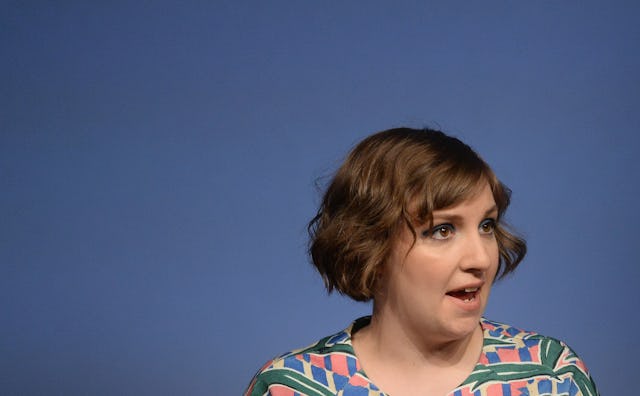5 Reasons the "Scandal" Has Nothing to Do With Lena Dunham

1. It’s about not understanding anything about sexual development in girls, and being uncomfortable with any discussion of it.
Girls do not go from Teletubbies to Sophia Loren with nothing in between. Jia Tolentino‘s excellent interview with Debby Herbenick, a PhD and researcher in human sexuality, lays out the vast space between children’s normal genital exploration, with themselves and other children, and sexual abuse. Tolentino doesn’t address the charge of Dunham’s masturbating in the presence of another sleeping person, but I will: If we consider that abuse, we’d have to label every person who’s lived in a dorm or barracks as either abuser or victim. (And when I say, we are uncomfortable with any discussion of sexual development in girls, that obviously excepts situations in which adults blame children for their own rapes or police the clothing choices of girls lest they be too distracting to grown men.)
2. It’s about a rabid desire to tear down any female writer who thinks she has something to say.
Katie Roiphe notes that if Karl Ove Knausgaard’s much-acclaimed “My Struggle” had been written by Carla Olivia Krauss, the critical response would have been quite different: “A 30-page riff on going to a party with children, and trying to balance your food while watching your child, and what exactly happens to her shoes, would appear, if a woman wrote it, both banal and egoistic.” As Elisabeth Donnelly points out in Flavorwire, Emily Gould’s personal blogging work has been characterized as “overshare.” Women writing about their lives have to wade through a big layer of who cares about the details of your stupid life? Women writing anything at all—in fact, women doing anything of note at all, besides giving their livers to their children—have to endure a heap of who do you think you are? Gould herself, in Salon, says that the Dunham smear campaign is a threat to “all women who’ve had the courage to describe their lives as they truly are, despite the risk that critics will use any underhanded tactic imaginable in order to silence them.”
3. It’s about expecting women to be flawless, and the frothing-at-the-mouth rage when they fall short of perfection.
Lena Dunham has created a groundbreakingly feminist sitcom, a show in which young women are allowed to be vastly imperfect, both physically and temperamentally. It’s the open defiance of the male gaze—Hannah living her life, unconcerned with her flawed, un-airbrushed self—that’s astonishing and new. This is remarkable in the world of comedies in which the worst sin a (thin, gorgeous) woman is permitted is to be a neat freak: Monica on Friends; Jennifer Aniston in The Break-Up. (Or Sandra Bullock in the more recent movie The Heat, though the advent of Melissa McCarthy makes me wonder if now the two sins women are permitted are “too tidy” or “too messy.” Damned by housekeeping, always.)
Is Girls diverse? No. Neither was Friends or Seinfeld or How I Met Your Mother. Is Lena Dunham privileged? Yes. So are most successful people. No one’s worked up about the privilege of Charlie Sheen or Wallace Shawn. I’m not sure that Lena Dunham should crawl under a rock because she’s privileged and she populates her stories with white people. We absolutely don’t expect this from male artists—look at The Hangover, for Christ’s sake. This is a problem with Hollywood, and the world, not Lena Dunham. She’s doing something groundbreakingly feminist without solving other social problems at the same time. She can do some of the things without doing all of the things.
4. It’s about Planned Parenthood and women having access to reproductive health care.
Scott Stossel, an editor at the Atlantic, tweeted, “Interesting to note: attacks on @lenadunham’s book began day after her Planned Parenthood ad campaign began. Coincidence? Unlikely.” This “scandal” puts Planned Parenthood front and center again, courtesy of a right-winger who has suggested that women who have abortions should be hanged. Planned Parenthood’s spokeswoman is an overtly, defiantly sexual young woman who supports reproductive rights and liberal candidates—the right wing’s worst nightmare. And every woman with private parts that need tending should be worried.
5. It’s about our discomfort with successful women—even women who identify as feminists.
As Jessica Bennett writes in Time, “Feminism has a long history of what Ms. Magazine, in a 1976 piece by Jo Freeman, called ‘trashing.’ That is, taking jabs at women who suddenly rise up, helping elevate them, but then tearing them down when they become too successful. ‘This standard,’ Freeman wrote, ‘is clothed in the rhetoric of revolution and feminism. But underneath are some very traditional ideas about women’s proper roles.’” The unholy alliance of a right-wing blogger and feminists shows where some deeply felt notions of what a woman deserves, and her rightful place in the world, intersect across ideological lines.
Photo: Michael Buckner/Getty
This article was originally published on